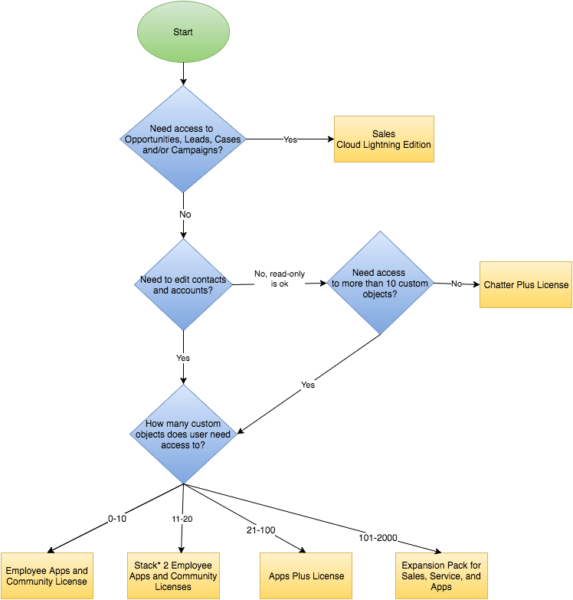Salesforce.org (and Salesforce.com) recently changed their pricing, configuration, and naming for licenses. This blog post reflects these changes.
Through the Power of Us program, Salesforce.org provides a great benefit for every qualified 501c3: a grant for 10 Lighting Enterprise Edition licenses. They also provide a significant discount for licenses needed beyond those 10. Even with that, license costs can add up with larger deployments. As anyone who has tried to dive into the depths of Salesforce licensing knows, figuring out the most cost-effective license type for your staff can get confusing.
We frequently advise clients on how to choose the most cost-effective staff licenses that provide the functionality they need. In our experience, there are a core set of license types that hit on the most frequent use cases for internal staff. The flowchart below provides a way to navigate these licenses. The license types identified are recommendations for what you should look at, but you will need to verify that they meet your needs.

Details on the chart:
What does license “stack” mean for Employee Apps and Community (also called Lightning Platform Starter)? This means you can purchase two licenses of this type for one user and allow them access to double the number of custom objects (to 20) allowed with just the base Employee Apps and Community licenses. The base license allows access to 10 custom objects.
Licenses in the yellow boxes are based on Salesforce.org naming. Here are links to the Salesforce.org pricing page for each of the above listed licenses:
- Lightning Enterprise Edition
- Chatter Plus (only available for organizations who have previously purchased these licenses)
- Employee Apps and Community (now Lightning Platform Starter).
- Apps Plus (now Lightning Platform Plus)
Licensing Do’s and Don’ts
Here are a few tips when thinking about Salesforce licensing:
- Do pay attention to the timing of your annual renewal cycle. When you purchase additional licenses you pay for the license from that point in time until the renewal date. By purchasing a license a few months before the renewal date, you can experiment with a new license types in production or get a full Sandbox for a short term project for a fraction of the full year cost. Just be careful though, these items will be included in your renewal unless you explicitly talk to your Account Executive and remove them. Salesforce.org has a detailed article on the renewal process.
- Do take advantage of rollup summary data when you can. Users can see the results of rollup fields without having access to the object being rolled up. An example of where this can come in handy is with the Nonprofit Starter Pack rollup fields. A staff member may need access to the summary Household level or Contact level donation information (most recent gift, total giving, etc.), but not individual gift history or campaign information. If that is the case, they could use a Chatter Plus, Employee Apps or Apps Plus.
- Don’t share licenses. I know, it can be tempting, but don’t do it. Here’s our post on the ten reasons why every user needs their own license.
- Don’t give staff limited licenses when they really need broader access to effectively do their jobs. Lack of access to the right information is a quick way to damage successful adoption.
- Don’t try to recreate standard functionality with custom objects just to avoid buying the correct licenses. There are many reasons why this is a bad idea, including missing out on new functionality with each release and ending up with a non-standard system that doesn’t work well with 3rd party applications.
- Do educate yourself on the nuances of the various licenses. Good resources include:
- Sales Cloud Lightning Edition features. Note that pricing is the Salesforce.com pricing, not Salesforce.org pricing. Salesforce.org customers get the Enterprise Edition listed in this document.
- Platform/App Cloud. Note that pricing is the Salesforce.com pricing, not Salesforce.org pricing.
- Chatter Plus.
Does your organization have more complicated needs than outlined here? Your Salesforce.org Account Executive and/or your implementation partner will be able to provide additional guidance.